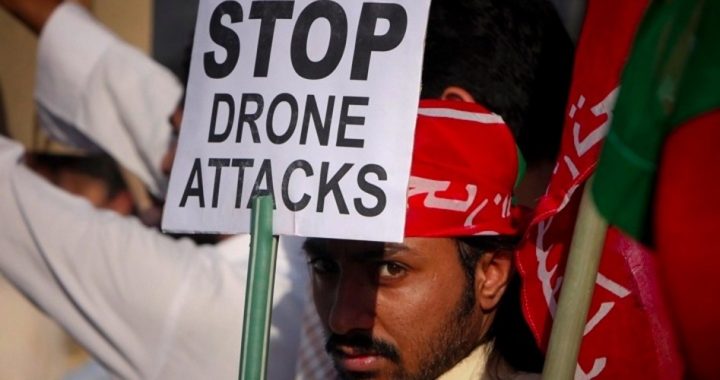
According to an unnamed U.S. official quoted by the Washington Post, the United States will reduce its use of drones in prosecuting the “War on Terror” in Pakistan.
In a story published on February 4, the Post reported that in order to give the government of Pakistan time to negotiate peace with the Pakistani Taliban, the Obama administration will dial down the drone strikes in the country that has been the target of at least 354 strikes by the deadly unmanned vehicles.
The Post added, however, that the administration would continue to conduct strikes “against senior al-Qaeda targets, if they become available, and move to thwart any direct, imminent threat to U.S. persons.”
Although it has been nine months since the president announced it and most people seemed to have forgotten it, this limited scope for drone assaults was the standard established by President Obama in May 2013 during a speech at the National Defense University.
Even at that time, Pakistani media described the president’s promises to rein in the rain of missiles fired from U.S. drones as too little too late.
The government of Islamabad is trying, seemingly successfully, to remove this major obstacle in the road to peace with the Pakistani Taliban.
Peace talks have been underway for just over a month now, as reported by The New American’s Warren Mass:
Negotiations between the Pakistani government and representatives of the Pakistan Taliban (TTP, which stands for Tehreek-e-Taliban Pakistan) began on January 6 in Pakistan’s capital, Islamabad. The talks are aimed at resolving the ongoing insurgency between the TTP — an umbrella organization of Islamic militants based in Pakistan’s northwestern Federally Administered Tribal Areas — and the government.
Irfan Siddiqui, a government negotiator chosen by Prime Minister Nawaz Sharif, sent a text message reading “Talks on,” and described the atmosphere as “cordial and friendly.”
AP reported that Sharif made an announcement last month that his government intended to pursue negotiations and named a four-member team led by Saddiqui, a journalist, and one of his own advisors. Also in the government group was another journalist, a former spymaster, and an ex-diplomat.
Apparently, talks between the Pakistani government and the TTP began in earnest after the United States announced the withdrawal of troops of Afghanistan. Officials in Islamabad and the ISI (the Pakistani intelligence service) worry that the TTP will move into that vacuum and join forces with their allies in Afghanistan and more seriously threaten the stability of the Pakistani government.
Although it seems contrary to their own interests to negotiate with the TTP, the Pakistani government is in good company when it comes to the strategy of sitting down with the Taliban.
In June 2011, Secretary of State Hillary Clinton said that peace negotiations in Afghanistan must include the Taliban if they are to be successful in achieving long term stability of the nation.
At the time, there was very little uproar over Clinton’s remarks, regardless of the fact that at least 1,500 American fighting men and women have given their lives to the cause of defeating those whose favor we are now courting so aggressively.
Imagine the reaction in the United States of the 1940s if an official of the Roosevelt or Truman administrations had announced that in order to foster stability in post-war Germany we would invite leaders of the Nazi party to sit down at the negotiating table.
“While the prospect of negotiating with the Taliban might seem repugnant, it is necessary to stabilize the country politically and demonstrate American commitment to the government’s sovereignty,” Clinton said.
Given Mrs. Clinton’s internationalist bona fides and support of a slew of big-government programs and policies, it is curious to see her so zealously protecting a nation’s sovereignty.
Secretary Clinton admitted that this Taliban outreach scheme was “not a pleasant business,” but the United States would have to hold its nose and swallow the Taliban if we hope to “produce more stability.”
What of the Taliban’s reported ties to America’s nominal enemy in the Global War on Terror: al-Qaeda?
Officially, the Obama administration insists that the Taliban, to be a factor in the governing equation of Afghanistan, will have to denounce its ties to al-Qaeda and to terrorism. A curious demand given that it is the Taliban’s decades-long history of terror that once made its predecessor organizations so attractive to the United States as a thorn in the side of the former Soviet Union and a check on that nation’s expansionist efforts in the ’80s.
Al-Qaeda, that’s the “real” enemy. As mentioned above, the administration will continue to hunt alleged al-Qaeda operatives wherever they’re found — Pakistan, Afghanistan, Yemen, Somalia, etc. This isn’t just bellicose blustering of a president with an albatross of domestic policy failures dragging him down, though. President Obama has demonstrated that he is gung-ho to launch a drone and fire off a volley of Hellfire missiles, leaving questions of identity to the coroners.
Curiously, this drone-delivered denial of due process has the bipartisan backing of many leading congressional Republicans. In fact, one of them recently called out the president for playing nice with potential threats to the security of the homeland. As the Post reports:
Rep. Mike Rogers (Mich.), the chairman of the House Intelligence Committee, said Tuesday that policy changes made by President Obama last year to the drone program “are an utter and complete failure, and they leave Americans’ lives at risk.”
Rogers cited the spread of al-Qaeda offshoots in Yemen, Syria and Africa, and said that “individuals who would have been previously removed from the battlefield by U.S. counterterrorism operations for attacking or plotting to attack against U.S. interests remain free because of self-imposed red tape.”
President Obama, in public, seems to want to ratchet down the hawkish rhetoric. According to the Washington Post, White House spokeswoman Caitlin Hayden said:
The president has made clear that even as we aggressively pursue terrorist networks — through more targeted efforts and by building the capacity of our foreign partners — America must move off a war footing. We will not be safer if people abroad believe we strike within their countries without regard for the consequence.
Is the White House finally starting to recognize the genuine, generational danger posed by blowback?
Blowback is a very real consequence of the way consecutive presidential administrations have executed the “War on Terror.”
As The New American has chronicled, the methods to the mayhem that is the drone war have bred far more enemies than they have eliminated. In fact, the thirst for vengeance created by the viciousness of the use of this deadly remote control force not only poses a clear and present danger, but will likely prove to be a self-perpetuating, multi-generational menace to the safety of many liberty-seeking people worldwide.
Since 2006, drone strikes have resulted in the death of over 2,700 Pakistanis. How many of these people would have been found guilty by a court of law had they had the opportunity to defend themselves against the charges of Islamic militancy?
From “double-tap” strikes (that kill not only the target, but also anyone trying to retrieve the body) to the “signature strikes” (that target groups displaying “militant behavior” rather than individual suspects believed to be planning attacks on the United States), this indiscriminate assassination of those not charged with any crime or suspected of any ill will is creating more enemies than it is eliminating.
For now, publicly at least, the United States will scale back the drone war in Pakistan. Islamabad, in the meantime, will take advantage of the lull to make nice with the Taliban, hoping that the reduction in U.S. drone strikes will offset the reduction in U.S. troops in Afghanistan, and prevent the TTP from increasing violence against innocent Pakistanis.
Photo: AP Images
Joe A. Wolverton, II, J.D. is a correspondent for The New American and travels frequently nationwide speaking on topics of nullification, the NDAA, the Second Amendment, and the surveillance state. He is the co-founder of Liberty Rising, an educational endeavor aimed at promoting and preserving the Constitution. Follow him on Twitter @TNAJoeWolverton and he can be reached at [email protected].



